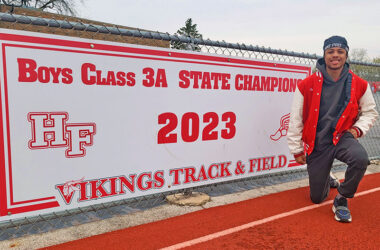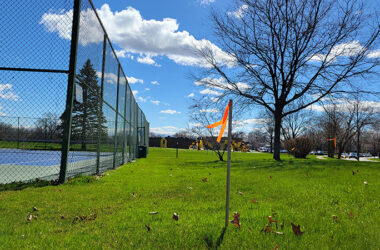A teacher in the hall sees a swastika hung from the inside of a student’s locker. How should that teacher respond?
Teachers, administrators and staff at Homewood-Flossmoor High School have been discussing that and other scenarios in training sessions led by a team from the Anti-Defamation League (ADL) as part of District 233’s approach to cultural competency training, an outgrowth of its 2019-2024 strategic planning process.
Lara Trubowitz, education director for ADL Midwest, said the sessions are designed “to equip educators with the competence and the skills to respond effectively to biased-based behaviors and incidents in schools.”
“We want the educators to feel they’re the problem solvers, the change makers. Our role is simply to give them a template, a framework to think through some of the issues our educators and students are confronting today,“ she said.
H-F scheduled four training days this year. The final session is March 20. Sessions are presented by ADL and Front Porch, whose sessions dealt with building the sense of community at H-F.
“I think it’s been positive,” Trubowitz said of the trainings. “I think they value the opportunity to talk with one another on issues that are happening in the classroom, in the hall, that are impacting their students, that doesn’t have anything to do with what test is going on or what new mandate is being presented to them.”
Trubowitz said the ADL sessions are divided into two parts: 1) Help educators understand what biases are and how their own biases might shape their interactions and 2) Provide them with the tools to know how and when to respond to an incident within a framework that can help them address the situation.
H-F staff work in small groups for “The Cards You’re Dealt,” an exercise in which they try to relate to the person on the card. Trubowitz gave the example of a single mother with eight children.
“We get them thinking about what are the assumptions they’re making about that identity … Basically, what we’re saying is that in order to stand in somebody else’s shoes, you have to take your own shoes off first,” she said. “We’re asking them to think about assumptions they might not be fully aware of.”
In the second exercise, participants created their own scenarios related to student and staff interactions because: “We really wanted to make them aware that the scenarios they were developing felt real to them, they could potentially happen in a school system,” she said.
H-F High went through a traumatic incident in spring 2019 when several students wore blackface, used offensive language against a restaurant worker and posted the incident to social media.
Trubowitz said ADL was aware of the incident because it had been working with Village of Flossmoor administrators on anti-bias programs and had interacted with school officials.
“It was very important for all of us that whatever training we brought in was about sustainable learning. Though an incident may have been the catalyst for us to come in, everyone understood that you can’t just assume that we come in and the things that led to the incident disappear quickly,” she stressed.
“It’s work that has to be ongoing and sustained over the course of the period, has to be integrated into every component of the school and that’s why I think both the principal and superintendent thought (the training) should include all staff,” she added.
H-F Principal Jerry Anderson said, “With a large diverse staff, building community is important for increasing our capacity to work collaboratively for the benefit of our students. An inclusive diverse community in which all individuals feel accepted for who they are and have the desire to learn more about each other is the kind of community we want to continue to build at H-F.
“The Anti-Defamation League helps us delve into who we are as individuals along with our understanding of race, culture, biases, and equity,” the principal said.
“We get to know ourselves better so we can work more effectively with our students using a culturally responsive curriculum.
A culturally responsive curriculum is one which is tailored to the learning style of our students and incorporates the cultures of our students,” Anderson added.
Additional information on ADL’s efforts to fight discrimination and its programs are at www.adl.org.



